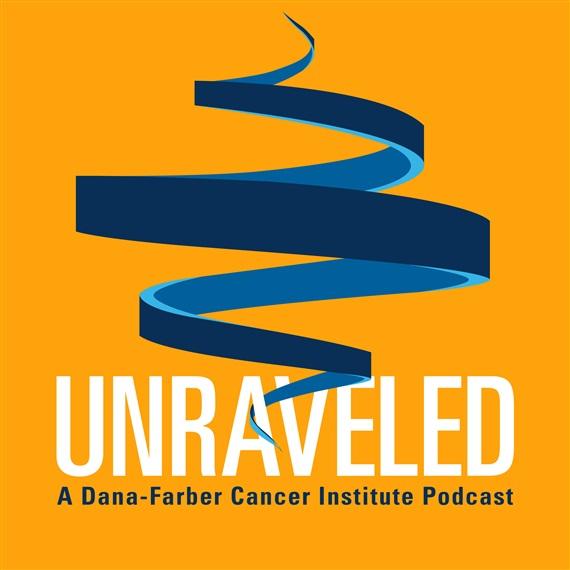Season two of Unraveled podcast now available
Popular podcast tells stories of the science and researchers behind some of the most important cancer discoveries
The second season of Unraveled: A Dana-Farber Cancer Institute podcast is now available with six new episodes telling stories of the science and scientists behind some of the most important cancer discoveries, diving deep into the lab.
The podcast’s second season theme is momentum. The new stories showcase the momentum that takes therapies from test bench to bedside, and then back to test bench for fine tuning; the momentum of the researchers, who defy headwinds and even gravity to keep science moving forward; the momentum doctors harness, with treatments and care that transform once lethal cancers into treatable conditions.
The first of six episodes debuted on February 1 with subsequent episodes to drop every two to four weeks.
The podcast can be found at www.dana-farber.org/unraveled as well as in other places where podcasts are accessed.
Episode 1 - BCL-2 Inhibitors: Driving Cells to Destruction
The work of Anthony Letai and Matthew Davids and others on BCL-2 inhibitors is the fulfillment of work begun nearly 30 years ago under the late Stanley Korsmeyer, who made the initial discovery of BCL-2. Today, Venetoclax, used in combination with other approved drugs, such as the monoclonal antibody rituximab, are achieving striking results.
Episode 2 - Thalidomide and Its Second Act in Multiple Myeloma
In the era of modern, so-called "targeted" cancer medicines, creating new drugs generally goes something like this: Design a molecular wrench that will jam the gears of tumor cells by blocking the action of a particular protein (the "target"), thereby halting tumor growth. But a new paradigm is evolving, pioneered by a cadre of researchers at Dana-Farber, and its guiding principle is fundamentally different. Instead of blocking the activity of cancer-promoting proteins, toss them into the cellular garbage bin and remove them altogether. It's an approach known as targeted protein degradation, and it's gaining momentum.
Episode 3 - Stop The Division: CDK4-6 Inhibitors and the Cell Cycle
The story of CDK4/6 inhibitors – among the most broadly effective of all targeted therapies for cancer – was written to a large extent at Dana-Farber. It was Institute scientists who, in the late 1980s, helped identify the role of the cell proteins targeted by the drugs. It is Institute investigators who are leading a clinical trial of one such drug in almost 6,000 women around the world with a specific type of breast cancer. And it is Institute researchers who have shown in a group of highly influential studies over the past two years that the drugs may be even more powerful than originally suspected.
Episode 4 - Making it Personal: Targeted Cancer Therapies
In 2004, researchers at Dana-Farber and in Japan published a study showing that lung cancer patients whose tumors had a malfunctioning version of a protein called Epidermal Growth Factor Receptor (EGFR) responded dramatically to a drug that specifically targets the EGFR protein. The findings launched the era of precision medicine for lung cancer, transforming the way the disease is treated in many patients.
Episode 5 - With A Little Help From My Friends: Combination Immunotherapies
The success of PD-L1, featured in season one of Unraveled, ushered in a wave of immunotherapy. But only about 25% of cancer patients see the benefits from these checkpoint inhibitors. Today, there are some 5,000 clinical trials currently under way in the United States combining immunotherapy and other treatments, with the aim to expand immunotherapy’s benefits to more patients.
Episode 6 - Knowledge is Power: Big Data and Cancer Research
In this era of precision medicine, precise information is vital. Since its launch in 2011, Dana-Farber’s Profile has become one of world’s largest databases for genetic abnormalities in cancer. We look at the rise of big data and how it is driving answers and fueling cancer research.
Media Contacts
If you are a journalist and have a question about this story, please call 617-632-4090 and ask to speak to a member of the media team, or email media@dfci.harvard.edu.
The Media Team cannot respond to patient inquiries. For more information, please see Contact Us.
